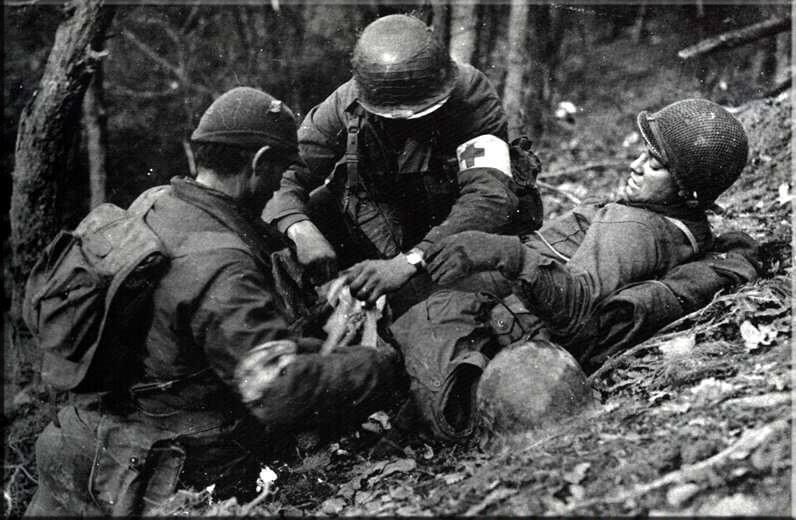by Tom Clavin
The Last Hill by Bob Drury and yours truly covers the dramatic campaigns of the 2nd Ranger Battalion in the summer and fall of 1944, culminating in the assault on Hill 400, the gateway to Germany. In this excerpt, the hill has been taken, but the battalion has suffered so many casualties, keeping it might be impossible. Then the Germans launch a counterattack…

Lieutenant Len Lomell knew what the green-and-mud-colored camouflage battle smocks signified. Fallschirmjagers. Luftwaffe paratroopers. The elite of the elite. Over one-hundred of them. Their bayonets fixed and swarming like ants up the southeast slope. Behind them, a bit further east, another howling German unit burst from what was left of the tree line. Volksgrenadiers. The olive-green uniforms gave them away.
By this point in the war the Reich was not only running out of raw materials to fuel its war machine—iron ore, oil, copper, aluminum, nickel—its mills were also bereft of wool. The consequent reliance on synthetic fabrics meant that the sharp-pleated field-grays with their striking green lapels in which Wehrmacht soldiers had marched into Paris in 1939 had by now been replaced with a less ornate version worn by the Volksgrenadiers. Still, Volksgrenadiers or not, their weapons were just as lethal. Lomell had seen the propaganda pamphlets dropped over enemy lines. The horde now racing up Hill 400 did not look like the rumored old men and boys to him.
Hours earlier, in the eerily quiet moments between taking the hill and the beginning of the artillery barrages, Lomell had had managed to gather 91 Rangers from Fox and Dog Companies. Platoon integrity had long been shattered, and Lomell recognized his force was too weakened to hold a continuous line across the hilltop. In anticipation of a counterattack, he’d assigned several two-man scout patrols to ease their way down the slopes facing the Roer River to determine where the enemy was reassembling. The intel had allowed him to mass his own defenses facing the direction from which the German paratroopers and Volksgrenadiers were now charging.
As they closed, the edgy Americans dug in as best they could to avoid the deadly sprays of lead from the barrels of Sturmgewehr 44s. They waited on Lomell’s signal even as potato mashers seemed to darken the sky. And waited. Lomell remembered Robert Rogers’s 13th Rule of Rangering: Reserve your fire till they are very near. The two assaulting enemy groups had nearly converged when he hollered. “Now.”
A cascade of bullets tore into the Germans. They fell like dominoes.
* * *
Sergeant L-Rod Petty had scratched out a shallow depression behind the thick trunk of a downed pine tree. His heart seemed to skip a beat when the Fox Company PFC Fred Dix suddenly fell in beside him. Petty’s blood was boiling. Moments earlier he had carried the shredded body of Sergeant Jack Anderson into the aid bunker. Unlike his brother Bill, at least Jack Anderson was still breathing.
Fred Dix, his right foot stitched by automatic rifle fire, had more bad news. His friend and fellow PFC Garness Colden was still out there in no-man’s land. Dix pointed to a spot some twenty yards downhill where two small uplifts in the ground created a natural crevice. Colden was in that narrow notch, Dix told Petty. Too hurt to move. Dix had tried to carry him. He couldn’t.
Dix gimped away, and Petty shimmied out of his hole. Pressing his BAR lengthwise to his chest, he rolled in the direction of Colden’s position.
Petty and “Garney” Colden shared a special bond. In the hold of the troop ship carrying them from England to Normandy, Colden had pulled Petty aside and made him promise to write to his father—“his daddy,” Colden had called him—if he was killed. Colden told Petty how his father had shaped his life, how much he loved him, and how he hadn’t told him enough. A posthumous letter from his platoon sergeant saying just that would surely ease the pain of his son’s death. The two Rangers had shaken on it, with Petty wondering what it must have been like to have had an affectionate dad.
Now, when Petty reached the slight furrow, he found the mortarman Murrell Stinnette, the former swabbie, already working on Colden. Sgt. Stinnette was pressing one hand on Colden’s stomach to prevent his guts from squirming out. He was pouring sulfa onto the shrapnel wound with the other.
Stinnette’s service shirt and open field jacket were dripping with fresh blood. Petty assumed it was Colden’s. Then Stinnette began bleeding from his mouth. Petty tore open Stinnette’s jacket. The sergeant was leaking blood from multiple bullet wounds and growing paler by the second. Petty decided to get him to the medical bunker first and come back for Colden. Stinnette would not have it. He let Petty know it with a string of oaths. The Navy had taught Stinnette to curse well. Though Petty outranked Stinnette, he followed his orders like a yardbird.
Petty threw Colden over his shoulders and dashed madly through the shellfire. After handing the young enlisted man to a medic in the bunker, he asked after Jack Anderson. The aid man’s look said it all. First Bill Anderson, now his brother Jack. Petty let out a primal scream – “There is no God!” Where the hell were Big Stoop Masny and the reinforcements? Where were Able and Baker and Charlie and Easy Companies? Didn’t anybody know what was going on up here? Without Big Jim Rudder, the outfit had truly seemed to run SOL. Shit out of luck. Then he dashed back for Stinnette.
When Petty reached the crevice, Sgt. Stinnette was dead, bled out. He would only later learn that Garny Colden had joined the Anderson brothers and Murrell Stinnette on the 2nd Battalion’s lengthening list of KIAs atop Hill 400.
* * *
The gunfight enveloping Len Lomell had devolved into a stalemate. The Germans who survived the initial broadside had taken cover behind the plethora of downed trees and were trying to pick off the dug-in Rangers. No more than twenty yards separated the combatants. A new sound had entered the fray, the thlip-thlip-thlip of burp guns. Lomell, who had nearly melted the barrel of his Thompson, eyed the battalion radio in his shallow hole. He thought about contacting Howard Kettelhut to call in artillery. No. As good as Kettelhut had proven, the enemy was too close. Friendly fire might kill them all.
Then, to his left, a shriek like Lomell had never heard before. He watched, astonished, as the Dog Company Platoon Sergeant Edwin Secor leaped from his foxhole and tossed aside his BAR, its stock mangled by an enemy bullet. Secor fell on two wounded Germans, seized their burp guns and, still screaming at the top of his lungs, charged into the enemy flank firing the machine pistols from both hips.
Ed Secor was widely considered the most introverted, mild-mannered noncom in the outfit, a veritable Patroclus whom, back in Tennessee—when Secor was still a private—few Rangers expected to make Major Rudder’s final cut. One day outside of Brest, Secor and the brash, cigar-chomping Technical Sergeant Joe Stevens had briefly broken the Fabulous Four’s single-day record for captured prisoners, bringing in just over a hundred. Afterward, Secor had retired to his tent without a word while Stevens—the self-styled Achilles of the partnership—larked about the battalion’s bivouac like a conquering hero.
Now, apparently, Secor’s pent-up emotions had apparently slipped their brake, as if he had donned the Myrmidon armor. In an instant one Ranger rose to follow him, and then another, and another, until a dozen men had caught up. By now Secor had emptied the burp guns and was firing his sidearm. Led by Secor, the Rangers slashed into the German flank and rolled it up in a frenzied feat of bloodletting. The fear in the panicked German paratroopers leached into the Volksgrenadier ranks. They began to fall back, at first by ones and twos, then by squads and platoons. Secor and his small band of warriors chased them nearly to the banks of the Roer.
* * *
Ken McClure had managed to fire off several bursts from his submachine gun at the approaching wave of attackers before his world went dark. When he came to, he was being carried toward the triage station by two Rangers he did not recognize. He grunted out a question, more like a series of slurred words. One of his litter bearers said that the Germans had been beaten back. McClure estimated that there were two dozen wounded Rangers spread about the floor on top of the jumbled mass of papers he had noticed earlier. Someone jabbed a syrette of morphine into his leg just as the concrete blockhouse began to shake from multiple artillery hits. Between the incessant shelling, McClure also thought he could hear the sound of scattered firefights. Then he lost consciousness.
* * *
It was just past noon on December 7 when Len Lomell entered the bunker to check on the wounded. Ken McClure, awake now but still groggy, tried to rise. He could not. Given the devastation atop the hill, McClure assumed that Lomell was now in command of the entire Ranger force. Lomell gave McClure a quick nod and headed for the doorway. McClure watched as Lomell huddled with a small circle of sergeants from Dog and Fox Companies, including Ed Secor, Mike Sharik, L-Rod Petty, and Herm Stein. The noncoms, their uniforms splotched with drying blood, all looked battered.
Lomell did not mince words. Capt. Morton McBride had never even made the hilltop, and Big Stoop Masny was God-knows-where. Lt. Tom Rowland had been shot dead repulsing a German flanking probe, and—hitching his good right thumb over his shoulder—Lt. Ken McClure lay in a corner of the bunker with his right leg torn to hell, not far from where Lomell’s fellow Dog Company platoon leader, Lt. George Kerchner, was nursing a shoulder wound.
Lomell was the last officer left standing on Hill 400. With disabled Rangers rasping out futile cries for medics across the crest, fear and frustration were slowly eroding the resolve of the combined thirty-two effectives from the two companies still fighting. Lomell repeated the number. Thirty-two.
The United States Army was not a democracy, Lomell said, but in this case he was willing to make an exception. His eyes moist with tears, he asked the sergeants for a vote on whether he should order a pullback to Bergstein. The Germans, he believed, would treat the American wounded left in the aid bunker.
The noncoms voted no to a man. They would hold the hill. One sergeant “prayed to God to be gentle with my parents when they learned of my death.”
Originally published on Tom Clavin’s The Overlook.

Tom Clavin is a #1 New York Times bestselling author and has worked as a newspaper editor, magazine writer, TV and radio commentator, and a reporter for The New York Times. He has received awards from the Society of Professional Journalists, Marine Corps Heritage Foundation, and National Newspaper Association. His books include the bestselling Frontier Lawmen trilogy—Wild Bill, Dodge City, and Tombstone—and Blood and Treasure with Bob Drury. He lives in Sag Harbor, NY.
